Shows
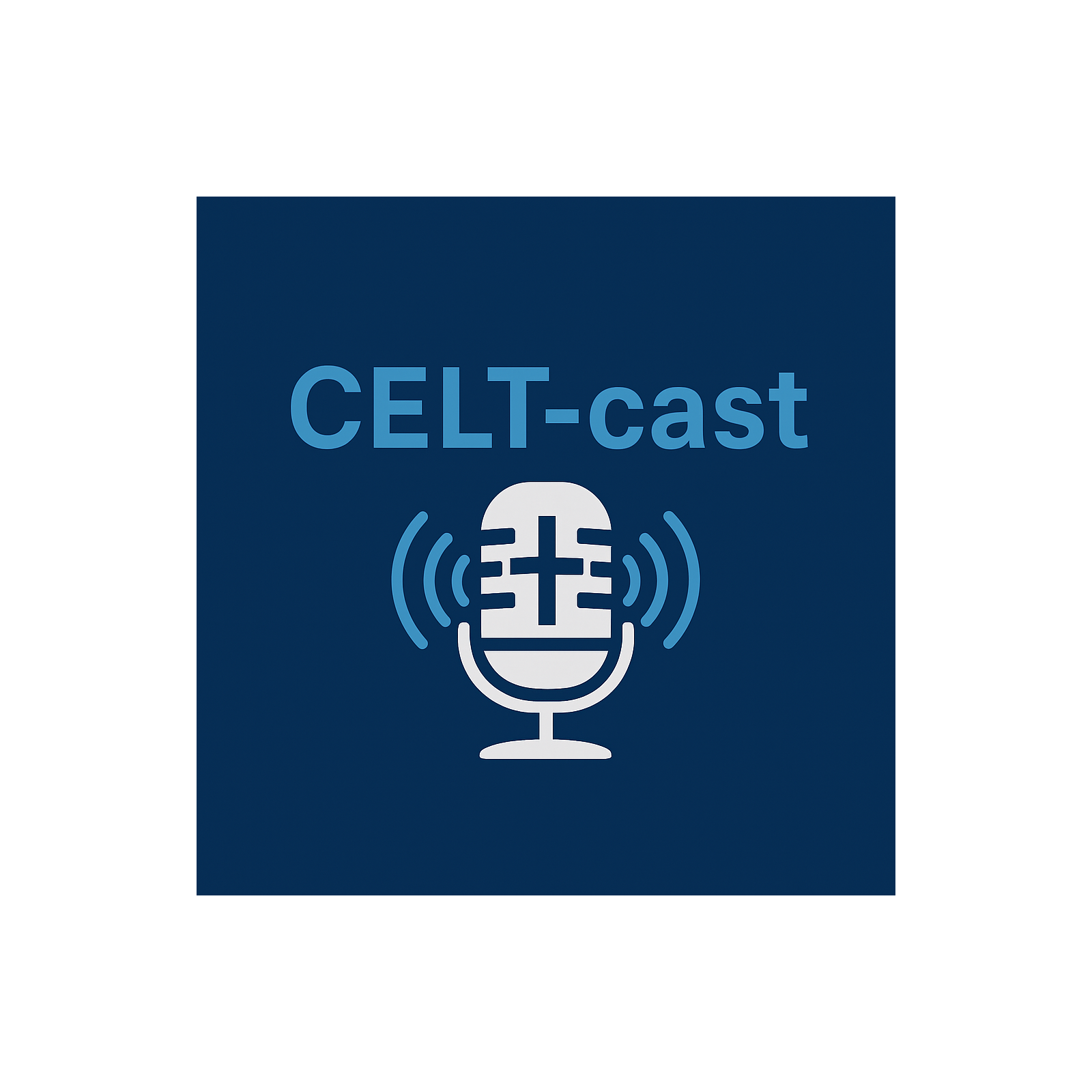
CELT-castCELT-cast: Dr. Jarek JanioCELT-cast: AI and the Flipped Classroom: Moving from Content Coverage to Skill DevelopmentHosts: Kate Robertson and Rob Balza, Center for Excellence in Teaching and Learning, Concordia University Wisconsin & Ann ArborGuest: Jarek Janio, Faculty Coordinator for the School of Continuing Education at Santa Ana College and the California Outcomes Assessment Coordinators Hub.Produced by: Ashley CurtinEpisode SummaryIn this episode, hosts Rob Balza and Kate Robertson welcome Yarek Janio of Santa Ana College and the California Outcomes Assessment Coordinators Hub to discuss his recent article in The...
2025-11-2440 min
Friday SLO TalksBehaviorism Applications to Student Learning and Assessment with Nancy Marchand MartellaThis Friday SLO Talk examines how behaviorism provides a clear, evidence-based framework for instruction and assessment built on one central idea: learning is observable behavior. If students haven’t learned, the educator hasn’t yet found the right way to teach. This philosophy shifts accountability from students to teachers, viewing instructors as detectives who design environments where success is inevitable.The discussion centers on explicit and systematic instruction—the “I Do, We Do, You Do” model—where skills are modeled, practiced with feedback, and mastered through independent performance. When paired with a clear scope and sequence, this approach ens...
2025-11-0815 min
Friday SLO TalksBehaviorism Myths, Misconceptions with Ronald C MartellaThis Friday SLO Talk with Drs. Ronald and Nancy Martella challenges common misconceptions about behaviorism and reintroduces it as a precise, ethical, and evidence-based framework for understanding learning and motivation. The discussion emphasizes a simple but powerful truth: behavior is shaped by the environment, not by invisible mental states. When teachers design conditions that promote success, learning becomes predictable, measurable, and replicable.Behaviorism views learners as active participants whose actions are selected by consequences. The three-term contingency—Stimulus → Response → Stimulus (S-R-S)—explains how antecedent cues prompt behavior and how reinforcing outcomes make that behavior more likely to reoccur...
2025-11-0817 min
Friday SLO TalksAI, Education, and the Scientific Method with Lizelena Iglesias and Vi HawesIn this episode, educators and innovators explore how generative AI can transform classrooms into continuous experiments in growth. Drawing from the October 10, 2025 session Empowering Inquiry: AI and the Scientific Method in Practice, the discussion reveals how AI can support every stage of scientific inquiry—from background research and hypothesis formation to data analysis and communication.Adult educators Lizelena Iglesias, Vi Hawes, Dr. Jarek Janio, and Enrique Jauregui unpack how AI tools can boost problem-solving, data interpretation, and critical thinking while helping teachers model evidence-based teaching. The conversation reframes prompt engineering as a new literacy—an experimental skill that...
2025-10-1813 min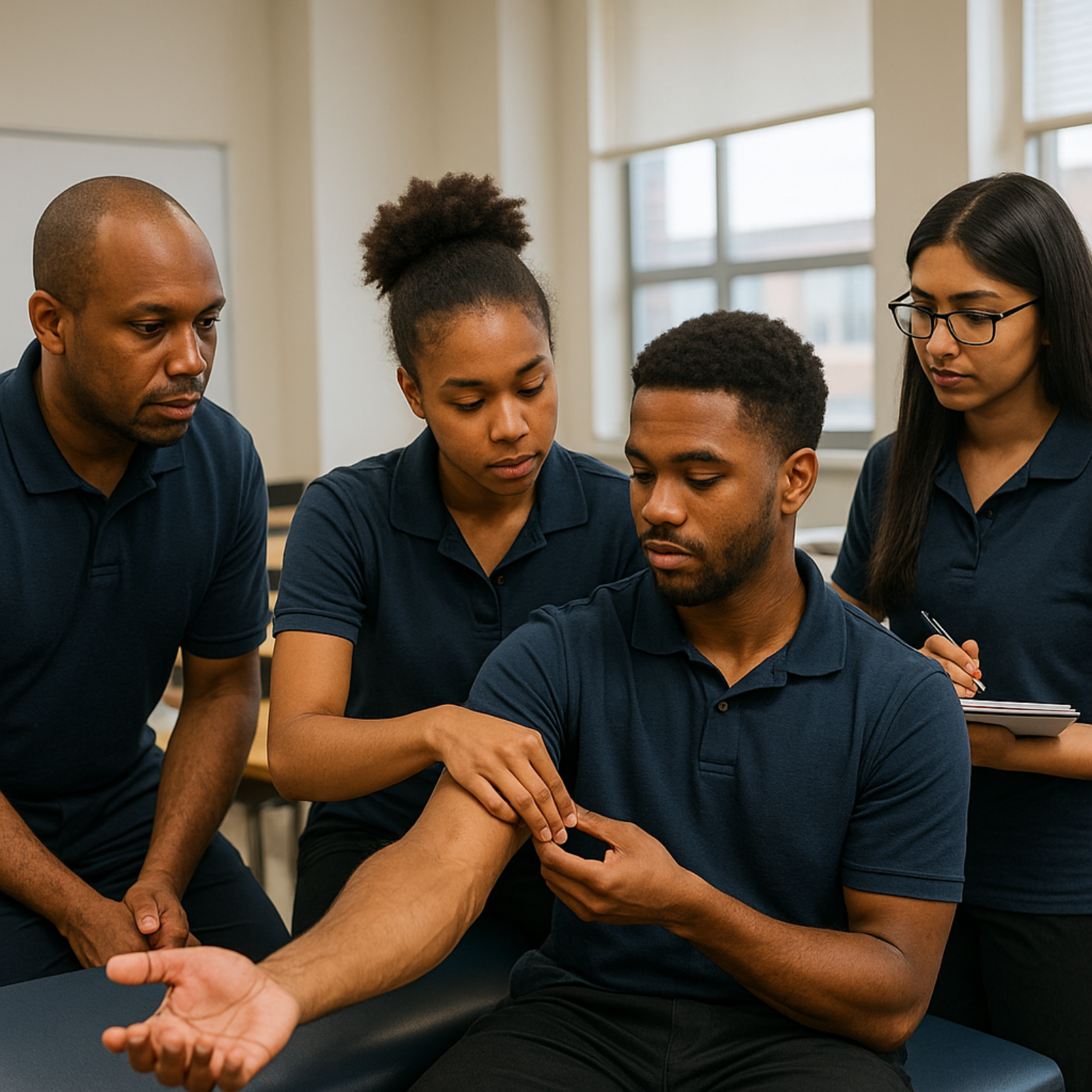
Friday SLO TalksBeyond Transcripts: Beyond the Transcript: Measuring What Physical Therapy Students Truly Learn In this session, Dr. Pavithra Suresh and Dr. Sabrina Altema of Howard University share how the Doctor of Physical Therapy (DPT) program has built a student-centered, equity-driven model of assessment that goes far beyond the traditional transcript. Their approach focuses on preparing graduates who are not only clinically competent but also culturally sensitive and deeply committed to serving under-resourced communities.The presentation highlights Howard’s university-wide framework, the Howard Annual Assessment Process (HAP), and its six guiding pillars: centering students and equity, honoring community expertise, prioritizing quality over compliance, fostering collaboration, ensuring transparency, and cultivating lifelong learning....
2025-10-0413 min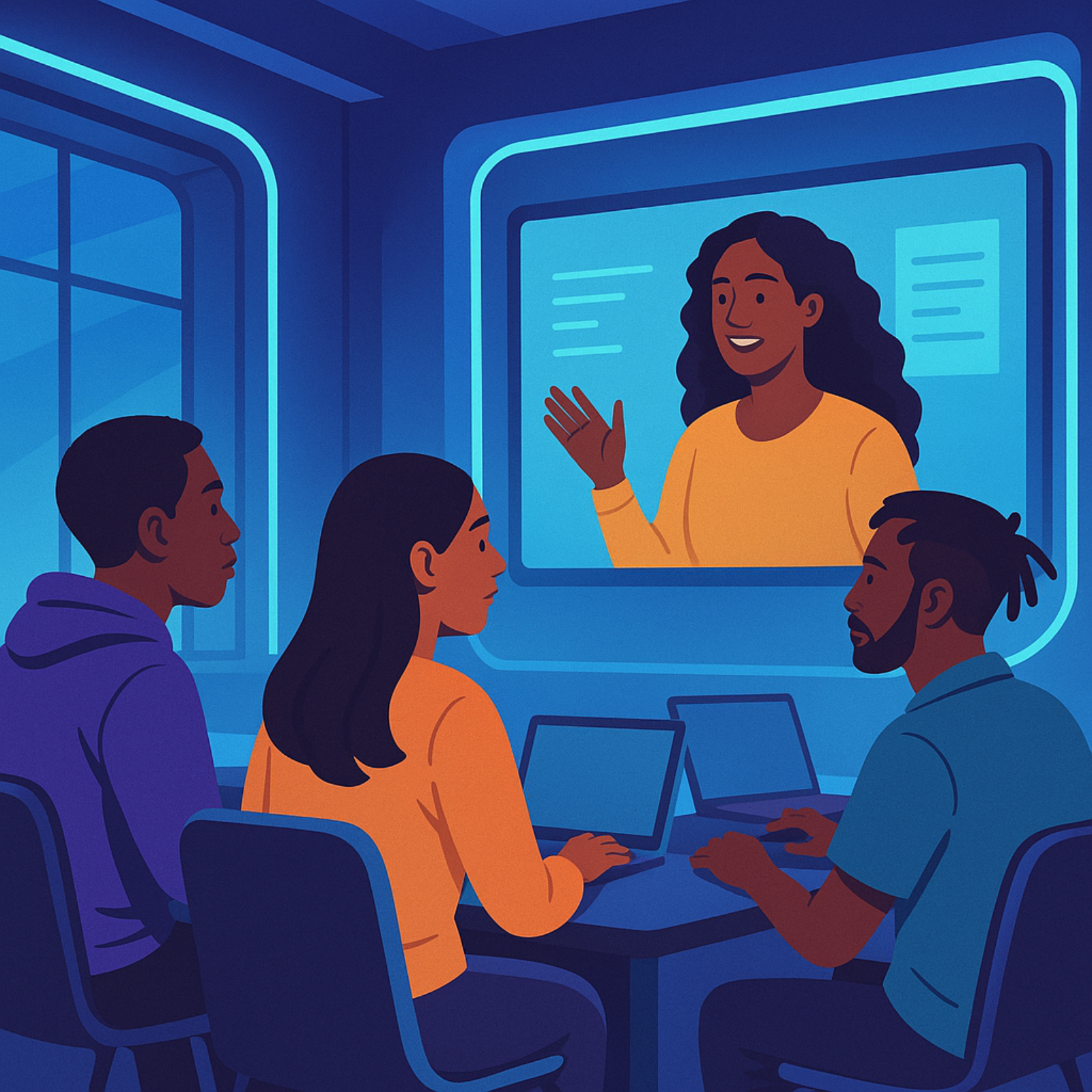
Friday SLO TalksHyFlex Learning Assessment Using Generative AIDr. Brian Beatty from San Francisco State University discussing "Addressing the Challenges of Assessment in HyFlex Courses Using Custom GPTs." Dr. Beatty, a professor of instructional design, introduces the concept of HyFlex learning, which blends face-to-face, synchronous, and asynchronous online instruction to offer students flexible participation choices, initially developed to address enrollment issues. A significant portion of the discussion focuses on how he leverages generative AI—specifically custom GPTs built on platforms like ChatGPT—to support both student self-assessment and faculty course design in these complex, multi-modal environments. He details various student-facing GPT tools he created for engagement and form...
2025-09-3019 min
SLOs in Action: Tracking Competency and Mastery LearningThe Battle Over AI in Higher Education Classrooms Is Being Fought in the Field of Student Agency published in EvolllutionIn "The Battle Over AI in Higher Education Classrooms Is Being Fought in the Field of Student Agency," Jarek Janio explores the integration of artificial intelligence (AI) in higher education through the philosophical lens of Heidegger, emphasizing AI as a technology that reveals human values and priorities. Rather than viewing AI as a threat to traditional teaching methods and academic integrity, Janio encourages educators to reframe AI as a tool that enhances student learning and agency.Janio argues that traditional assignments focused on recalling information or reproducing existing knowledge become obsolete in an AI-driven landscape. Instead, educators...
2025-05-0110 min
Friday SLO TalksFrom Theory to Clinical Competency: A Case Study in Authentic, Performance-Based Nursing Education with Dr. Stacy Greathouse and the Team from University of Texas at ArlingtonIn this Friday SLO Talk, Jarek Janio from Santa Ana College and Enrique Jauregui from Fresno City College host a dynamic session highlighting an innovative nursing course development project from the University of Texas at Arlington (UTA). Dr. Leslie Jennings, Missina Minter, Megan Zara, and Dr. Stacy Greathouse, an interdisciplinary team nicknamed the "Motley Crew"—share their collaboration model for building a high-impact, competency-based perioperative nursing course.The panel describes how the course originated in response to the national nursing shortage, aiming to prepare students for perioperative roles in operating rooms. Dr. Jennings, a perioperative nurse with ov...
2025-04-2718 min
SLOs in Action: Tracking Competency and Mastery LearningNothing but Skill in the Assessment Review"Nothing But Skill" by Jarek Janio argues that education should emphasize skill demonstration and competency rather than traditional metrics like grades and test scores. Janio asserts that all human interactions, particularly in classrooms, rely on observable behaviors which demonstrate underlying skills and competencies. Despite historical skepticism towards behaviorism due to its association with manipulation, the author maintains that education inherently shapes behavior, expecting students to demonstrate learning in approved ways.Faculty often focus on student behavior as indicators of learning, making inferences based solely on observable skills like communication and interaction. Thus, Janio argues, education must intentionally...
2025-03-2610 min
Friday SLO TalksAssessment of Student Learning: The Case for Observable Behavior with Dr. Jarek JanioPodcast Episode: Assessment of Student Learning – The Case for Observable Behavior with Dr. Jarek JanioIn this episode of Friday SLO Talks, organized by the California Outcomes Assessment Hub (COACHES), Dr. Jarek Janio from Santa Ana College led a compelling discussion on the role of observable behavior in assessing student learning. The session challenged traditional metrics of success such as grades, graduation rates, and course completion by questioning whether they truly reflect learning or simply institutional priorities.The Gap Between Institutional and Student Success MetricsDr. Janio identified a disconnect between what students se...
2025-03-1907 min
Friday SLO TalksGenAI – Your Supercharged Assessment Assistant with Dr. Gavin HenningHere’s a more detailed description of the episode:Podcast Episode: GenAI – Your Supercharged Assessment Assistant with Dr. Gavin HenningIn this episode of Friday SLO Talks, organized by the California Outcomes Assessment Hub (COACHES), Dr. Gavin Henning, professor of higher education at New England College, provided an in-depth look at how Generative AI (GenAI) is revolutionizing assessment in higher education. With over 25 years of experience in student learning assessment and institutional research, Dr. Henning explored the practical applications of AI in streamlining assessment processes, reducing faculty workload, and improving the quality of learning outcomes.
2025-03-1720 min
SLOs in Action: Tracking Competency and Mastery LearningRethinking Metrics in Higher Ed: Moving Beyond Persistence and Retention"Rethinking Metrics in Higher Ed: Moving Beyond Persistence and Retention": by Jarek JanioThis article highlights a growing crisis of confidence in higher education, driven by an over-reliance on procedural metrics like retention, persistence, and graduation rates, which fail to address the fundamental question: "What do students actually learn?" While these metrics are easily quantifiable, they do not demonstrate whether students are developing essential skills or emerging as capable, adaptable thinkers. The author calls for a fundamental shift toward measuring student learning outcomes, emphasizing the need to assess competencies and align institutional priorities and funding models with...
2025-01-2515 min
Leading Improvements in Higher Education with Stephen Hundleys05e04: A Conversation with an Assessment Leader Involved in Championing Student Learning Outcomes (SLOs)This episode features a conversation with a higher education assessment leader involved in championing Student Learning Outcomes, or SLOs as they are also known. Our guest is Jarek Janio, who, in addition to being a faculty member at Santa Ana College, is also one of the founders of the California Outcomes & Assessment Coordinator Hub, otherwise known as COACHes, which provides plentiful resources for those involved in working with SLOs. Link to resource mentioned in this episode:California Outcomes & Assessment Coordinator Hub (COACHes):https://coaches.institute/ This season of Leading Impr...
2025-01-211h 02
SLOs in Action: Tracking Competency and Mastery LearningEmpowering ESL Voices: Skills Over PerfectionChallenging Linguistic Gatekeeping and Embracing Diverse VoicesBriefing Document: Key Takeaways from "Although I Speak ESL, I Still Have Something to Say" by Jarek Janio, ESL FacultyThis document summarizes the main themes and insights from Jarek Janio's article, which advocates for shifting the focus from rigid grammar rules to fostering inclusive communication that values diverse perspectives.Core Themes1. Linguistic Gatekeeping: Judging ESL speakers solely on grammatical accuracy marginalizes their valuable contributions and creates barriers to participation, especially in professional and academic settings."Linguistic gatekeeping occurs when language proficiency...
2025-01-0409 min
SLOs in Action: Tracking Competency and Mastery LearningWhen Machines Generate Answers: Why Faculty Questions Still Matter?Rethinking AI and Inquiry in Higher Education: A BriefingThis briefing analyzes a blog post by Jarek Janio titled "Do Submarines Swim? Rethinking AI and Inquiry in Higher Education," published on the COACHES website. The post explores the role of AI in education, arguing that its strength lies in data processing, not human-like thinking. Janio emphasizes the crucial role of faculty in guiding students toward inquiry-based learning, utilizing AI as a tool to enhance critical thinking and problem-solving skills.Main Themes:AI as a Predictive Engine: AI excels at analyzing vast amounts of data...
2025-01-0414 min
Friday SLO TalksDevan Walton - Tools for Program Level Assessment1. The Evolving Role of Assessment Professionals: As AI automates routine tasks, assessment professionals must focus on higher-order skills like identifying key data, designing effective data collection strategies, and interpreting AI-generated insights. "These tools are going to allow us to collect a lot more data about students… giving us deeper insights into what’s working and what’s not in our programs."2. Agent-Based AI Models: The transition from dialogue-based tools (e.g., ChatGPT) to autonomous agent-based models introduces new considerations for task delegation and ethical use. "When we have models that we can delegate tasks to, it becomes critic...
2025-01-0309 min
Friday SLO TalksPeter Shae - Trends in AI and Instructional DesignAI and Instructional Design in Higher Education1. A New Pedagogical Model: AI offers an opportunity to transition from traditional teaching methods to "generativism," a novel approach combining evidence-based learning principles with AI technology. This shift is essential for maximizing AI's potential. "We are largely trying to use AI to drag along an older pedagogical model... rather than build an entirely new model using the unique affordances of AI."2. Institutional AI Adoption: Colleges and universities vary in their approach to AI adoption, characterized as:Ostriches: Ignoring AI.Crows: Slowly exploring policies.Falcons: Actively experimenting with...
2025-01-0312 min
Friday SLO TalksJoanna Boeing - Cautionary Considerations for AI in Higher EducationCautionary Points and Considerations Around the Adoption and Use of AI in Higher Education1. AccessibilityAvailability & Communication: Institutions must clarify which AI tools are accessible to students, faculty, and staff, balancing enterprise versus free versions and effectively communicating available resources.Cost & Equity: Free versions often have security risks and limited features, while enterprise versions raise concerns about equitable access for all students.Faculty Attitudes: Faculty views on AI range from banning its use to fully embracing it. Those embracing AI must educate students on responsible and ethical usage.2. Dependence...
2025-01-0317 min
Friday SLO TalksAnne Converse Willkomm - Policy and AIAI in Higher Education: Policy, Impact, and EthicsDrawing from her experience as a faculty member and policy developer at Drexel University, Willkomm identifies critical focus areas as institutions adapt to the fast-evolving landscape of AI.I. Policy Considerations:Willkomm highlights the urgency of developing AI policies that address the needs of all stakeholders: faculty, students, and staff.Faculty: Institutions must ensure faculty understand AI's capabilities, limitations, and ethical implications. Providing clear guidelines on responsible AI use in classrooms is vital for both educators and students. "We created documents to help...
2025-01-0318 min
Friday SLO TalksBobbijo Grillo Pinnelli, Walden University, AI's Impact on Assessment Practitioner's RoleThe Impact of AI on Assessment ProfessionalsSource: Excerpts from "Bobbijo Grillo Pinnelli.txt"(transcript of the presentation)Main Themes:The rapid evolution of AI and its impact on the roles of assessment professionals.The need for assessment professionals to adapt and acquire new skills to remain relevant in the age of AI.A predicted shift from traditional assessment roles towards more strategic, coaching, and leadership positions.Key Ideas and Facts:1. The Changing Landscape:The speaker, Bobbijo Pinnelli, reflects on the initial anxiety and uncertainty surrounding AI's impact on assessment...
2025-01-0309 min
Friday SLO TalksRuth Slotnick - AI Adoption DataAI in Higher Education AssessmentMain Themes:Urgency of AI adoption in assessment: Assessment professionals need to proactively engage with AI tools and their implications for student learning despite feelings of overload or a wait-and-see approach.Leadership role of assessment professionals: Professionals must lead AI adoption in their institutions, building policies and practices, and collaborating within and across institutions.Human-AI partnership: While AI offers opportunities to enhance assessment practices, human oversight remains crucial for ethical considerations and ensuring the validity of insights.Shifting roles in assessment: The traditional role of the assessment director is predicted to...
2025-01-0313 min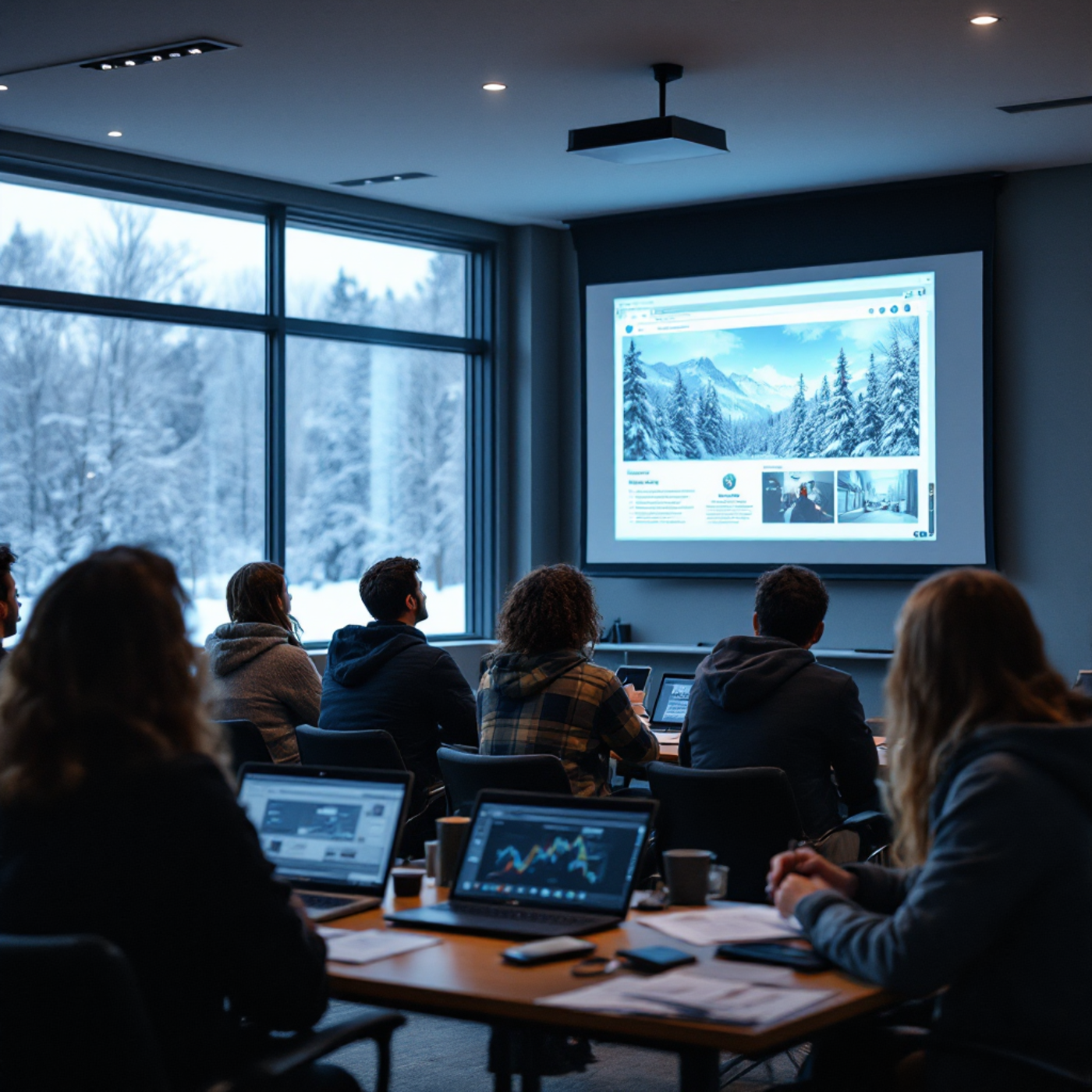
Friday SLO TalksStudent Learning Outcomes: SLOs, PLOs, and ILOsDemystifying Student Learning Outcomes (SLOs) in Higher EducationMain Themes:Defining and differentiating Student Learning Outcomes (SLOs) from other outcome measures in higher education.Understanding the relationship between SLOs and student achievement.Exploring the interconnected levels of learning outcomes: Institutional (ILOs), Program (PLOs), and Student (SLOs).Addressing the challenge of aligning outcomes across these levels to ensure meaningful learning and achievement.Key Ideas and Facts:1. What are SLOs?SLOs are "observable and measurable demonstrations of what students can do as a result of instruction." They represent the specific skills, knowledge, abilities...
2024-12-1517 min
SLOs in Action: Tracking Competency and Mastery LearningActionable Student Learning OutcomesMaking Student Learning Outcomes (SLO) Assessment Meaningful and ActionableThis briefing document summarizes key takeaways and advice from Friday SLO Talks, hosted by California Outcomes Assessment Coordinators’ Hub (COACHES), focused on making SLO assessment meaningful and actionable.Main Themes:Collaboration and Support: Engaging with colleagues and networks like COACHES is crucial for sharing ideas, strategies, and mitigating the feeling of isolation often associated with SLO work.Focus on Learning: SLOs should be approached as a tool to enhance student learning, not simply a bureaucratic requirement. The goal is to equip students with skills and kn...
2024-12-1403 min
Friday SLO TalksSLOs: Centering Learning and Serving StudentsCentering Learning and Serving StudentsMain Themes:Student-centric approach: The current higher education system often prioritizes administrative processes and metrics over student needs and learning outcomes.Accountability through SLO assessment: Student Learning Outcomes (SLO) assessment is crucial for ensuring students gain real-world skills and knowledge, yet it remains underfunded and underutilized.Empowering faculty: Faculty are key drivers of student success but require adequate resources and institutional support to focus on learning.Redefining success: Institutions need to shift their focus from attendance and completion to actual learning outcomes as the primary measure of success.Key Ideas...
2024-12-1404 min
SLOs in Action: Tracking Competency and Mastery LearningAdvancing Student Learning Outcomes in Higher EducationStudent Learning Outcomes (SLOs) in Higher EducationMain Themes:Collaboration is key: Effective SLO implementation requires collaboration between faculty, staff, administrators, accreditors, community partners, employers, and students.SLOs should be student-centered: The current approach to SLOs often prioritizes accreditation requirements over student learning experiences. A shift towards a student-centric model is crucial.Capacity building is essential: Institutions need resources and support to effectively develop, implement, and assess SLOs.Key Ideas & Facts:1. The Collaborative Ecosystem of SLOsFaculty & Staff: Design and integrate SLOs into curriculum, assess student performance, and use results to improve...
2024-12-1329 min
Friday SLO TalksAdvancing Student Learning OutcomesMaking Student Learning Outcomes (SLO) Assessment Meaningful and ActionableThis briefing doc reviews key takeaways and advice from Friday SLO Talks, hosted by California Outcomes Assessment Coordinators’ Hub (COACHES). It explores tools, training, and frameworks to enhance SLO assessment and provides guidance for those new to the process.Main ThemesMoving beyond compliance to focus on student learning. SLO assessment should be viewed as a tool to enhance student learning and skill acquisition rather than a bureaucratic box to tick.Collaboration and leveraging resources. Connecting with colleagues, utilizing available technology, and engaging with professional de...
2024-12-1303 min
Friday SLO TalksGenerative AI in Education: Opportunities, Challenges, and Transformative PotentialHarnessing Generative AI for Enhanced LearningSource: Transcript of Dr. Curt Bonk's presentation. Friday SLO Talk: "How faculty can harness generative AI for enhanced learning. Part one", hosted by the Coaches Community College network.Main Themes:The educational landscape is rapidly changing: AI is the hot topic in education today, similar to MOOCs a decade ago.Generative AI presents both opportunities and challenges: While students are already utilizing AI for learning, educators are navigating awareness, resistance, and implementation stages.AI can enhance learning by fostering deeper engagement and critical thinking: Dr. Bonk emphasizes going...
2024-12-0717 min
SLOs in Action: Tracking Competency and Mastery LearningHarnessing Generative AI for Enhanced Learning: Main Themes:The AI Revolution in EducationAI is rapidly transforming education, particularly generative AI.Students are adopting AI faster than faculty, using it as a tool for learning efficiency and understanding.Students as Early AdoptersStudents utilize AI for research, summarization, paraphrasing, drafting, and feedback generation.This positions AI as a partner for deepening understanding and improving efficiency.Faculty Adaptation and OpportunitiesFaculty adoption lags behind due to anxieties about AI, including concerns about cheating and job security.AI offers educators opportunities to personalize learning, engage students, and enhance meaningful interaction.The Future of Learning with AIAI can facilitate personalized...
2024-12-0720 min
Friday SLO TalksThe Opposite of Cheating: Teaching for Integrity in the Age of AI Main Themes:The Higher Education Social ContractUniversities must certify students' knowledge and abilities to meet societal expectations.Generative AI (Gen AI) and Academic IntegrityGen AI introduces challenges and opportunities for education, affecting teaching and learning integrity.Shifting from Performance to MasteryTransitioning from performance-based assessments to mastery-oriented learning can reduce cheating and align with the realities of Gen AI.Most Important Ideas/Facts:The Social Contract and Gen AIHigher education's promise to certify students' abilities is threatened by Gen AI misuse.Gen AI enables students to misrepresent their knowledge and skills, undermining trust.Understanding Student Behavior and...
2024-12-0715 min
SLOs in Action: Tracking Competency and Mastery LearningPrecise Language in Education: Bloom's Taxonomy, UDL, and EquityLanguage of Precision in EducationMain Themes:Clarity and Precision in Teaching: Utilizing Bloom's Taxonomy verbs to transform ambiguous learning objectives into clear, measurable, and actionable goals.Universal Design for Learning (UDL): Designing instruction and assessments that are inherently accessible and inclusive to learners with diverse needs, backgrounds, and learning styles.Equity in Education: Ensuring equitable access to learning opportunities and fostering a sense of belonging and achievement for all students.Most Important Ideas/Facts:Bloom's Taxonomy as a Tool for Clarity: Bloom's Taxonomy provides a framework for classifying educational objectives into six cognitive...
2024-12-0506 min
SLOs in Action: Tracking Competency and Mastery LearningMeasuring Critical Thinking in EducationMaking Thinking Visible in EducationMain Themes:The need for measurable learning outcomes: Educational objectives must be specific and observable to be effectively taught and assessed.Translating thinking into action: Cognitive processes like "critical thinking" must be broken down into concrete skills and demonstrated through observable actions or outputs.The power of Bloom's Taxonomy: Utilizing Bloom's Taxonomy verbs helps define measurable learning outcomes and encourages students to reflect on their learning process more deeply.Moving beyond "I don't understand": Empowering students to articulate their learning challenges using specific language can lead to more effective learning and...
2024-12-0516 min
SLOs in Action: Tracking Competency and Mastery LearningRethinking Grades in the Age of AI"Grades as the Goal vs. Mastery of Learning: Lessons from Friday SLO Talks"The integration of AI tools like ChatGPT into education is spotlighting the limitations of grade-centric learning. While AI offers significant benefits, it exacerbates the existing problem of prioritizing grades over genuine mastery, necessitating a shift toward competency-based assessment.Key Themes1. Grades as a Flawed Metric Grades have long been the dominant measure of success in education, but this reliance undermines true learning. Students are incentivized to focus on achieving high marks rather than deeply engaging with and applying knowledge. As...
2024-11-2912 min
SLOs in Action: Tracking Competency and Mastery LearningMisalignment Between Grading and Learning Objectives in the Age of AIRethinking Grading in the AI Era: Prioritizing Learning Over MetricsThe growing use of AI tools in education, such as ChatGPT, is revealing fundamental flaws in traditional grading systems that emphasize quantifiable metrics over genuine learning. This shift calls for a systemic realignment of assessment practices to better reflect meaningful student learning outcomes (SLOs).Key Insights1. The Disconnect Between Grades and Learning: Traditional grading systems focus on measurable outputs like test scores, attendance, and assignment completion. While these metrics offer a surface-level indication of participation, they fail to capture deeper aspects of learning...
2024-11-2908 min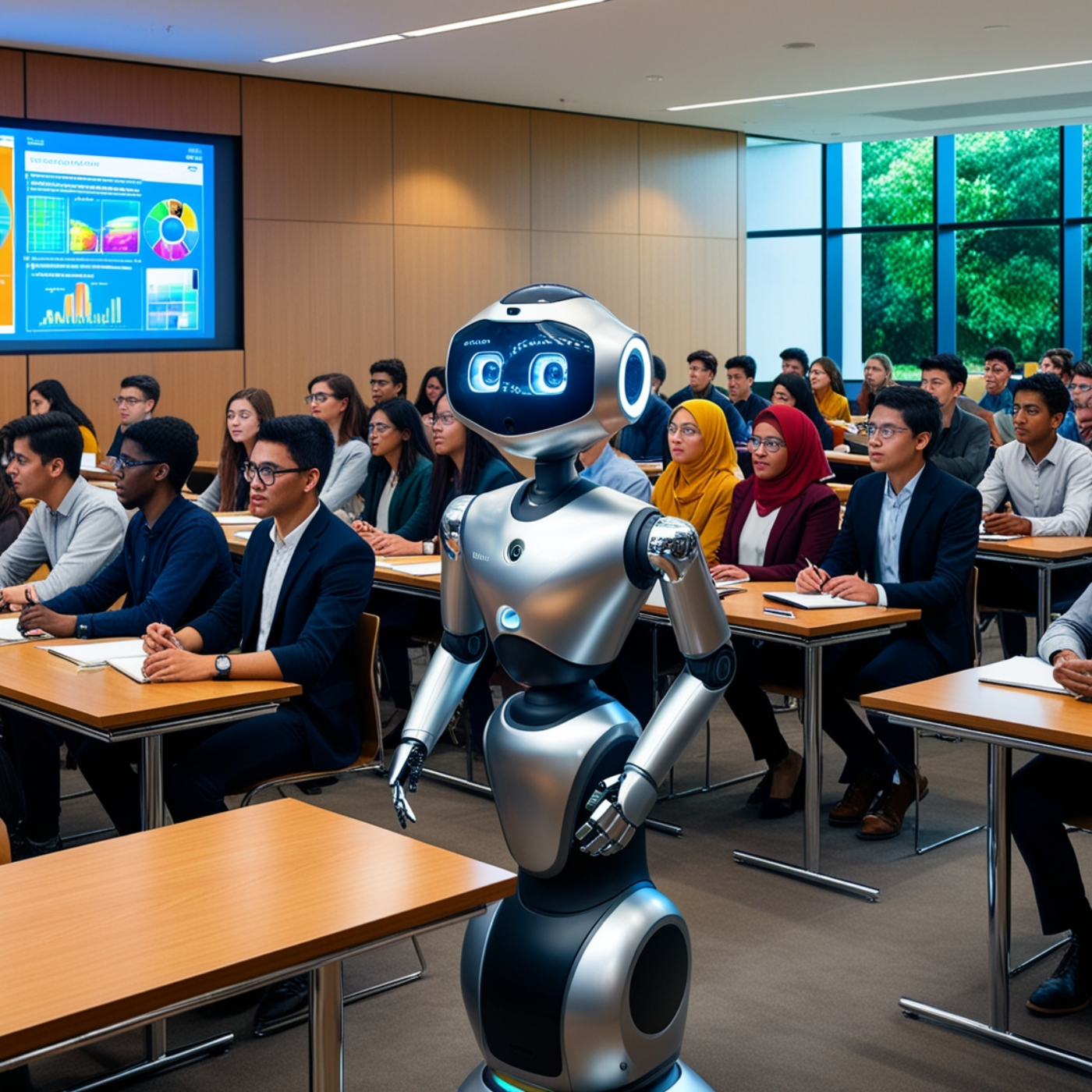
SLOs in Action: Tracking Competency and Mastery LearningAI and the Shortcuts to LearningRethinking Education in the Age of Artificial IntelligenceAI Enables Students to Shortcut the Learning Process discussion from Friday SLO Talks.Main Themes:The Erosion of Authentic Learning: AI tools like ChatGPT allow students to circumvent the traditional learning process, completing assignments without genuine engagement or understanding. This "shortcut" mentality prioritizes grades over intellectual growth, mirroring existing systemic issues within education. As Alfie Kohn argues in "Punished by Rewards," grades can "strip students of their natural curiosity," incentivizing them to chase external rewards rather than develop a genuine appreciation for learning (Kohn, 1993).The Inadequacy...
2024-11-2907 min
SLOs in Action: Tracking Competency and Mastery LearningAI and the Future of LearningFriday SLO Talks: AI and the Future of EducationThe recent Friday SLO Talks explored the integration of artificial intelligence (AI) in education, focusing on its opportunities and challenges. Central to the discussions was the need for pedagogical and systemic changes that prioritize student learning over traditional metrics.Key Themes & Insights1. AI's Dual Potential: AI tools like ChatGPT present significant opportunities:Enhanced Accessibility: AI provides students with immediate access to resources and guidance, fostering creativity and supporting independent learning, especially for those with limited access to traditional resources.Personalized Learning: AI can...
2024-11-2904 min
SLOs in Action: Tracking Competency and Mastery LearningRethinking Student Success: Moving Beyond Superficial Metrics in Higher EducationRethinking Student Success: Moving Beyond Superficial Metrics in Higher EducationThis podcast analyzes the equity implications of using proxies like course completion rates, GPAs, and graduation rates as the primary measures of student success in higher education. The podcast argues that these metrics perpetuate inequities by failing to account for the structural barriers faced by students from underrepresented backgrounds.Key Themes:Structural Barriers: Students from marginalized communities face systemic challenges like economic pressures and unequal K-12 preparation that impact their ability to succeed based on traditional metrics. These metrics fail to capture the significant...
2024-11-2510 min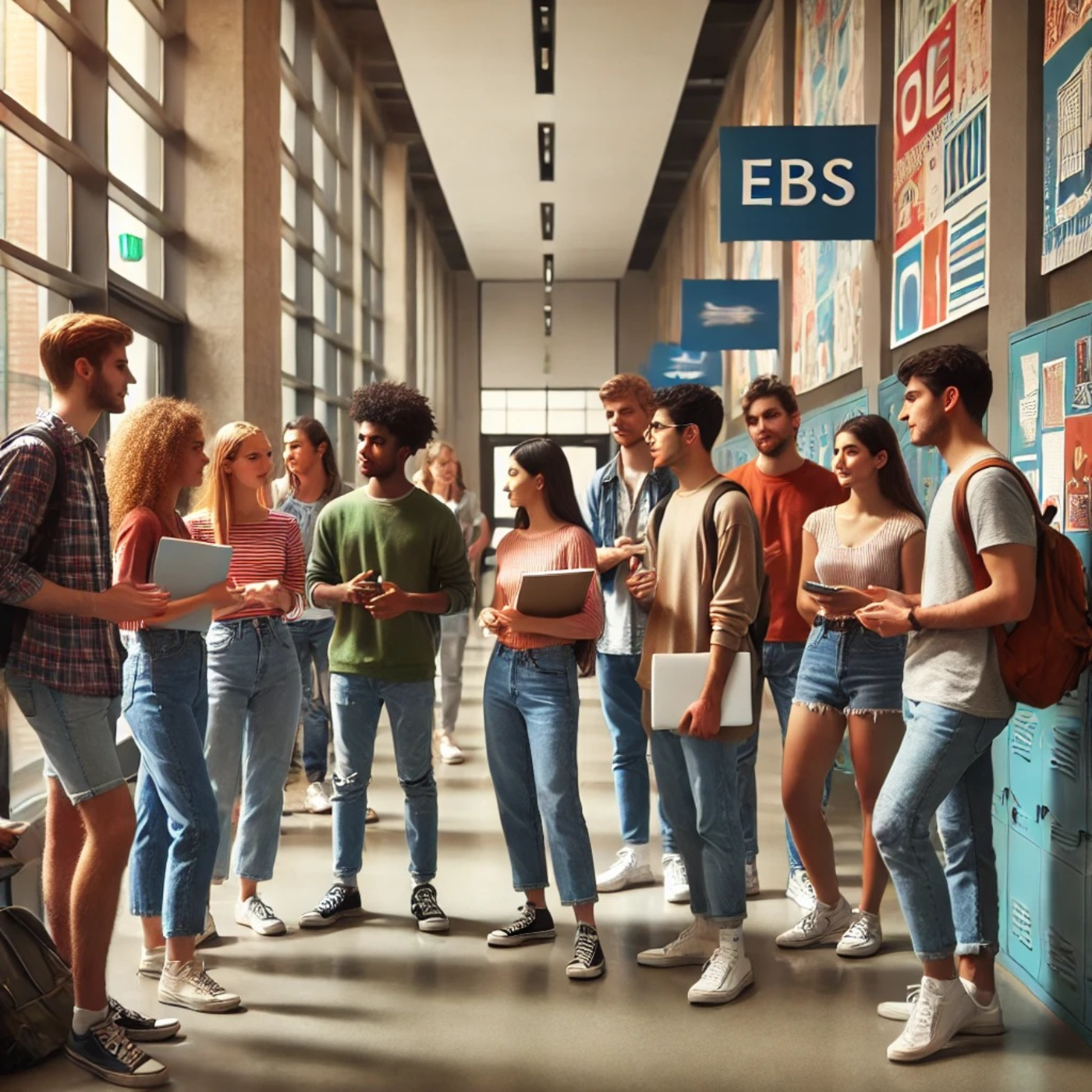
SLOs in Action: Tracking Competency and Mastery LearningFunding Higher Education: Aligning Resources with Learning OutcomesRethinking Higher Education Funding: A Focus on Observable OutcomesThis podcast reviews arguments for shifting higher education funding models to prioritize observable student learning outcomes (SLOs) over traditional metrics like attendance and degree attainment.The Problem: A System Misaligned with LearningCurrent higher education funding and evaluation rely on metrics that fail to answer the crucial question: "What are students actually learning?" While diplomas may indicate persistence, they don't necessarily guarantee mastery or workforce readiness. As the source states, "a diploma may reflect persistence but not necessarily mastery or readiness for the workforce."...
2024-11-2505 min
SLOs in Action: Tracking Competency and Mastery LearningProxies and Student Success in Higher EducationThe Danger of Equating Proxies with Student Success in Higher EducationThis podcast critiques the use of proxy metrics like course completion rates and GPAs as the primary indicators of student success in higher education.Main Theme: The current funding models in higher education, which rely heavily on proxy metrics, are detrimental to the true purpose of education and fail to prepare students for success in the real world.Key Arguments:Proxies Misrepresent Learning: Metrics like GPAs and diplomas do not accurately reflect the depth and quality of a student's learning. "A...
2024-11-2513 min
SLOs in Action: Tracking Competency and Mastery LearningPerformance-Based Funding: A Flawed ApproachPerformance-Based Funding in Higher Education: A Critical ReviewThis podcast examines the concept of Performance-Based Funding (PBF) in higher education, The podcast argues that while PBF aims to improve accountability and efficiency, it ultimately fails to promote authentic student learning.Key Themes & Issues:1. Misalignment of Funding Metrics with Learning Outcomes:PBF relies heavily on quantifiable metrics such as credit attainment, course completion rates, and degrees conferred. However, these metrics are criticized for failing to capture the complexities of learning and competency development.Quote: "While these indicators may suggest progress...
2024-11-2504 min
SLOs in Action: Tracking Competency and Mastery LearningPerformance-Based Funding: A Flawed ApproachPerformance-Based Funding: A Misguided Approach to Student LearningThis briefing document analyzes the flaws of performance-based funding (PBF) in higher education based on the provided excerpt from "Performance Based Funding PBF.pdf".Main Theme: PBF, despite its aim of improving higher education, fails to genuinely support student learning by focusing on superficial metrics rather than actual competency development.Key Arguments:Misalignment Between Funding Metrics and Learning: PBF relies on metrics like course completion and degree attainment, which are only indirect indicators of learning. The document states, "While these indicators may suggest progress...
2024-11-2504 min
Friday SLO TalksQueen Mary University: Driving change through leadership development and co-creationDriving Change and Co-Creation in Higher EducationFriday SLO Talk: Janet De Wilde, Emily Salines, and Stephanie Fuller of Queen Mary University of London. The presentation explores the challenges and opportunities of driving change in large, legacy institutions, particularly in the context of evolving student needs, economic pressures, and technological advancements.Co-creation as a Mechanism for Change: The speakers advocate for co-creation as a collaborative approach to implementing change, involving students, staff, and various stakeholders in the process.Leadership, Scholarship, and Recognition: The presentation highlights the importance of effective leadership, scholarship, and recognition systems to support...
2024-11-1810 min
Friday SLO TalksQueen Mary University: Exploring Assessment Choice to Enhance Practice and Inclusivity in Higher EducationExploring Assessment Choice to Enhance Practice and Inclusivity in Higher EducationFriday SLO Talks: Stephanie Marshall, Janet De Wilde, Emily Salines, and Stephanie Fuller of Queen Mary University of London's Queen Mary Academy.Main Themes:Inclusive Assessment: Queen Mary University prioritizes inclusive assessment practices, recognizing that assessment drives learning and significantly impacts student outcomes and well-being. The presentation explores how offering assessment choices can enhance inclusivity and support students from diverse backgrounds.Assessment Choice as a Driver for Change: The presentation highlights the benefits of assessment choice, such as promoting self-regulation, self-efficacy, engagement, and...
2024-11-1814 min
SLOs in Action: Tracking Competency and Mastery LearningSLOs and the Purpose of Higher EducationTakeaways from Friday SLO Talks: The fundamental purpose of higher education should be to ensure students learn and develop the skills, competencies, and mastery necessary to thrive in their personal and professional lives. While course completion is often used as a proxy for progress, it is not synonymous with meaningful learning. Here’s why focusing on learning over mere completion is essential:1. Competency Over ComplianceCompleting a course may indicate that a student has met attendance and submission requirements, but it does not guarantee they have acquired the knowledge or skills intended by th...
2024-11-1613 min
SLOs in Action: Tracking Competency and Mastery LearningSLOs and Funding for Higher EducationRethinking Higher Education Funding - Centering Student LearningCore Issue: The current higher education funding model in the United States, which prioritizes metrics like completion rates and attendance, is fundamentally misaligned with the true purpose of education: fostering student learning and preparing them for real-world challenges.Key Arguments:Disconnect Between Funding and Learning: The emphasis on superficial metrics incentivizes institutions to prioritize quotas over demonstrable learning outcomes. This "reduces education to a transactional process, stripping it of its transformative potential."Quote: "Faculty are pressured to 'pass' students to meet completion targets, while students are...
2024-11-1607 min
SLOs in Action: Tracking Competency and Mastery LearningFrom Survival to Mastery: The Real Purpose of Higher EducationThe concepts of growth mindset, habits of mind, and grit have gained traction as tools to help students navigate the challenges of higher education. These ideas emphasize teachable skills such as time management, perseverance, and self-regulation, which are important student learning outcomes.However, at many institutions, the focus remains disproportionately on metrics like student attendance, course completion, and diploma attainment, often neglecting the fundamental question: What are students actually learning?While these frameworks are useful for helping students manage resources and persist through obstacles, they must serve a larger purpose—skill and competency attainment. The ul...
2024-11-1605 min
SLOs in Action: Tracking Competency and Mastery LearningWhy Assessment of SLOs Matters?Importance of Measuring Learning: The podcast advocates shifting from evaluating knowledge acquisition to assessing the development of skills and competencies. Student Learning Outcomes (SLO) assessment is portrayed as essential for ensuring students can apply their learning in real-world scenarios, thus fostering skills that extend beyond the classroom.Benefits for Stakeholders: SLO assessment is depicted as a mutually beneficial tool for students, educators, and institutions. It facilitates targeted, effective instruction, empowers students to reflect on their learning progress, and demonstrates educational value to stakeholders. This approach helps align teaching practices with measurable student learning outcomes as understood by skills and competencies...
2024-11-1405 min
SLOs in Action: Tracking Competency and Mastery LearningWhat are Student Learning Outcomes?In this episode, we introduce the essential concept of Student Learning Outcomes (SLOs), unpacking their purpose, significance, and how they stand apart from traditional grading methods. We’ll discuss how SLOs focus not on what students can memorize but on what they can actually accomplish, representing a shift from assessing abstract knowledge to evaluating real, observable skills and competencies. By the end of this episode, listeners will gain a clear understanding of how SLOs support mastery learning, ensuring that students meet specific goals and can apply their learning in practical ways. This episode sets the stage for a deeper lo...
2024-11-1407 min
Friday SLO TalksTeaching Smarter with Research-Based Learning Principles with Marie NormanLearning Principles and Motivation Source: Excerpts from a Friday SLO Talk webinar featuring Dr. Marie Norman, co-author of How Learning Works: Eight Research-Based Principles for Smart Teaching. Main Themes:Teaching vs. Learning: Content expertise alone doesn’t ensure effective teaching. For instance, Isaac Newton, despite his brilliance, struggled to convey his knowledge through lectures."If you know a lot about something... you are then automatically qualified to teach. But... teaching has its own very specific set of skills and knowledge."Importance of Prior Knowledge: Students bring varied knowledge, beliefs, and misconceptions to the classroom. Ef...
2024-11-1018 min
Friday SLO TalksDesigning Assessment to Promote Student Learning with Sam ElkingtonThis podcast explores the pressing need for a transformation in higher education assessment practices, particularly given the impact of generative AI. Professor Elkington argues that traditional, high-stakes assessments fail to prepare students adequately for modern careers, advocating instead for a learning-centered approach that values process, feedback, and evaluative skills.Key Themes and Insights:Assessment’s Evolving Role: Current assessments often impose high stakes with limited relevance to future career demands. The narrow range of formats limits student expression. Generative AI challenges traditional assessments, prompting a reassessment of academic integrity and a renewed focus on distinctly human sk...
2024-11-1023 min
Friday SLO TalksFrom Compliance to Empowerment: Leveraging Transparency in Assessment Practice with Dr. Gianina BakerIn this episode, Dr. Gianina Baker, Associate Director of the Office of Community College Research and Leadership and Acting Director of the National Institute for Learning Outcomes Assessment (NILOA), explores how assessment practices in higher education can shift from a compliance-driven model to one focused on student empowerment and continuous improvement.Key themes include:Evolving Assessment Practices: Baker outlines how assessment began with an accreditation-driven approach but has increasingly moved towards a model that values student-centered and improvement-focused assessment.Transparency in Communication: The NILOA Transparency Framework is highlighted as a guide for institutions to effectively communicate...
2024-11-0713 min
Friday SLO TalksUsing Artificial Intelligence to Enhance Human Intelligence, Khan AcademyIn this episode, Kristen DiCerbo, Chief Learning Officer at Khan Academy, provides a deep dive into Khan Academy’s research-backed approach to improving student learning outcomes. From understanding the importance of usage in K-12 learning to unveiling the potential of AI-powered tools, DiCerbo shares insights on the methodologies driving Khan Academy’s commitment to educational efficacy and equity.Key themes include:Efficacy in Action: DiCerbo details how Khan Academy measures impact, emphasizing that even 30 minutes of weekly engagement can lead to significant learning gains. She explains that these benefits span across demographics, including gender, ethnicity, and soci...
2024-11-0715 min
Friday SLO TalksThe Changing Landscape of Writing in the Age of AI with Christina SupeIn this episode, Christina Supe examines how AI is reshaping writing, literacy, and authorship. She opens by highlighting literacy’s longstanding link to power and social mobility, emphasizing that AI tools might disrupt this by enabling “cognitive outsourcing.” This trend could risk intellectual stagnation and perpetuate existing power imbalances by reducing opportunities for critical thinking.The discussion challenges traditional definitions of a "writer," exploring AI as an agent that creates text and forces us to rethink what qualifies as writing and authorship. Supe raises ethical concerns, particularly about when AI assistance is appropriate. She emphasizes the need for cl...
2024-11-0716 min
Friday SLO TalksFrom Data to Decisions: Leveraging Storytelling to Inspire Change in Higher EducationIn this podcast, Ryan Smith, Director of University Assessment at Illinois State University, discusses how data storytelling transforms overwhelming data in higher education into actionable insights that inspire meaningful change. He addresses the challenge of institutions collecting vast amounts of data but lacking the capacity to utilize it effectively. Ryan advocates shifting from viewing data as purely objective to embracing the storyteller's role in crafting impactful narratives.Main Themes:Data Overload vs. Utilization: Institutions are inundated with data they struggle to use effectively. Data storytelling offers a solution by turning complex datasets into clear, compelling narratives...
2024-11-0721 min
Friday SLO TalksStorytelling as Assessment (R)evolution at Howard UniversityIn this podcast, Dr. Daphne Bernard and Glenn Phillips explain how Howard University enhanced its assessment process by incorporating storytelling to improve student learning outcomes (SLOs) and competency attainment.Context:Howard University, a historically Black institution with a unique mission, faced an accreditation review. Traditional, compliance-focused assessment methods didn't fully capture its rich educational experiences. The COVID-19 pandemic added further challenges.Integrating Storytelling:They adopted Banks-Wallace's framework:Story: Providing meaningful context to events.Storying: Weaving events into coherent narratives.Storytelling: Engaging stakeholders by sharing these narratives.Implementation:Faculty...
2024-11-0711 min
Friday SLO TalksBoise State University, Centers for Teaching and Learning as Partners in Assessment In this podcast, Teresa Focarile, Director of Educational Development at Boise State University's Center for Teaching and Learning (CTL), discusses how CTLs can serve as effective partners in assessment at both the course and program levels. The presentation highlights the pivotal role CTLs play in supporting faculty and enhancing student learning outcomes through collaborative assessment practices.Key Points:Role of CTLs in Assessment:CTLs support evidence-informed teaching practices and work to improve student learning.They assist faculty in course design, implementing effective assessments, and aligning learning outcomes with assessments.CTLs offer workshops, consultations, and programs to...
2024-11-0713 min
Friday SLO TalksStanford University, Centers for Teaching and Learning: Challenges and Successes in Faculty Support"Leveling the Learning Landscape: An Outcomes-Driven Approach to Equity-Focused Curriculum Change"In this podcast, Stanford University's Center for Teaching and Learning discusses their "Leveling the Learning Landscape" project—a five-year initiative aimed at transforming the undergraduate curriculum to enhance equity, accessibility, and student learning outcomes.Key Themes:SMART Goals for Curriculum Transformation:Utilizing Specific, Measurable, Attainable, Relevant, Time-bound goals to ensure clear and effective curriculum changes that enhance skills and competencies.Equity-Focused Curriculum:Addressing challenges of equity and belonging by redesigning courses, creating new learning pathways, and fostering inclusive learning environments.Collaborative Process:Engaging fa...
2024-11-0721 min
Friday SLO TalksMaximizing the Impact of Assessment: Linking Individual Achievement, Course-Based Data, and Student Learning OutcomesUtilizing Course Outcomes for Continuous ImprovementSource: Excerpts from a presentation by Dr. Will Miller, Associate VP for Continuous Improvement at Embry-Riddle Aeronautical University, on leveraging course-level outcomes for student success.Main Themes:The Unit Disconnect: Miller addresses the disconnect between program-level and faculty-level assessment views, resulting in fragmented learning for students. Misaligned courses and inconsistent objectives hinder students from synthesizing knowledge effectively.Quote: "The unit disconnect concerns me... It leads to fragmented learning."Holistic Assessment: Advocates for assessing the entire student experience, including academics and co-curriculars. Emphasizes aligning...
2024-11-0723 min
Friday SLO TalksExperiential Learning with Dr. Patrice Ludwig and Dr. Bill HeinrichKey Takeaways1. Experiential Learning (EL) as an Ecosystem:EL is a dynamic ecosystem involving students, faculty, administrators, employers, and community members. Each stakeholder has unique perspectives and expectations, creating a complex environment where definitions and approaches to EL vary. 2. The Multifaceted Nature of EL:EL encompasses diverse practices, from internships to cross-disciplinary projects. Given this diversity, acknowledging the varied approaches and epistemologies of EL across disciplines and institutional levels is essential for developing inclusive and effective assessment methods.3. Assessing the Full Cycle of EL:Effective EL assessment requires going beyond traditional grading...
2024-11-0719 min
Friday SLO TalksRethinking Assessment: A Learner-Centric Approach with Dr. Jo Alice BlondinMost Important Ideas:Questioning the Credit Hour: Dr. Blondin argues that while the credit hour is convenient for administrative purposes, it fails to measure genuine learning. She urges institutions to explore alternative methods that better reflect student competencies. "I've been associated with that battle for over 30 years… The credit hour drives financial aid, it drives transfer… but are we truly seeing results? Are we bearing fruit?"Prior Learning Assessment: Recognizing and valuing the knowledge students bring from previous experiences—whether through formal education, work, or life—is essential for equity and student success. "I urge you to h...
2024-11-0610 min